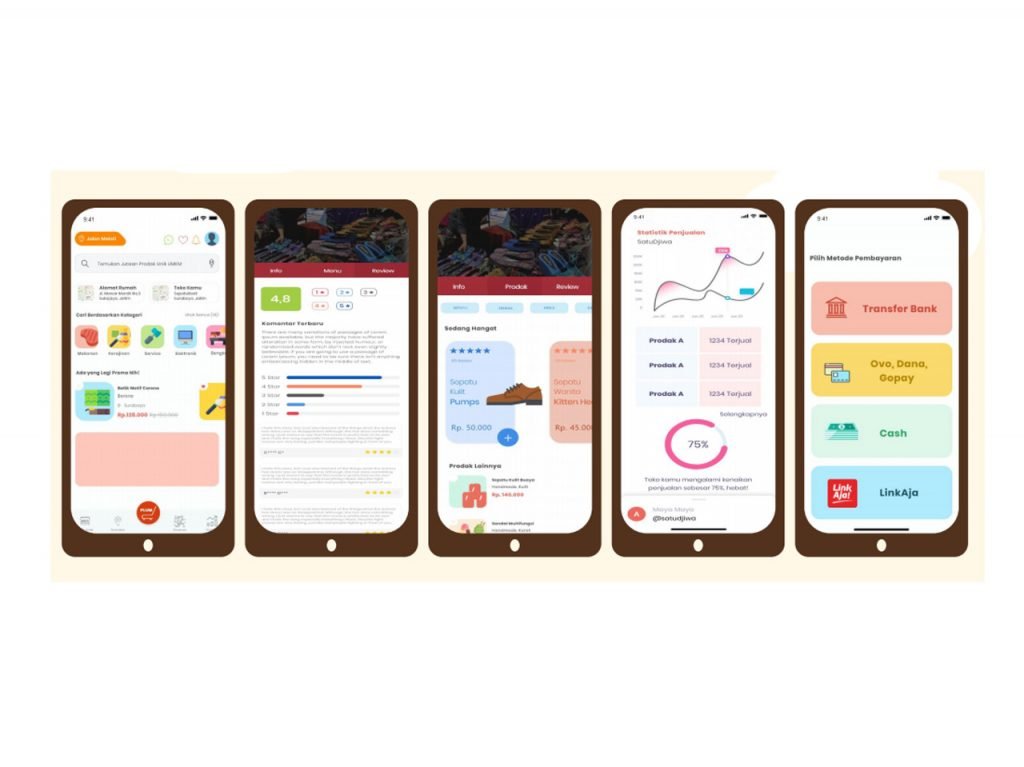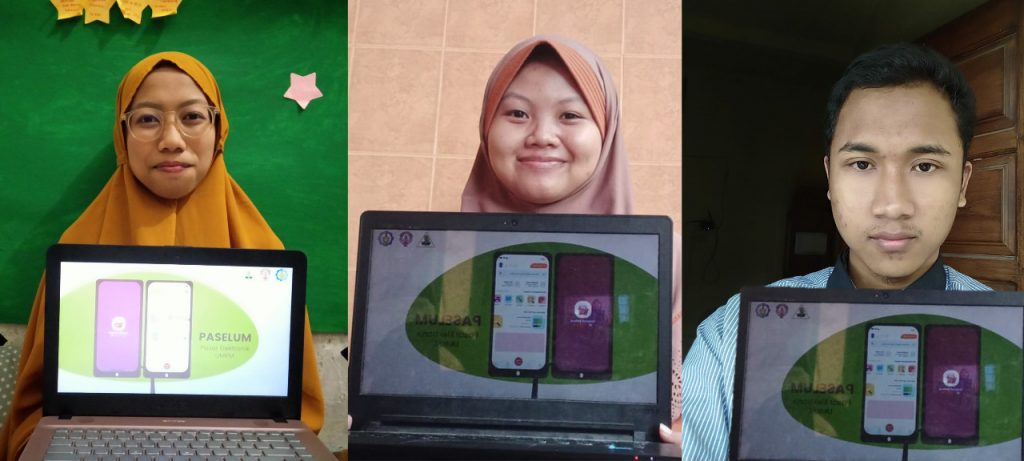Paselum, MSMEs Marketing Solution in Digital Era by ITS Students

The display of the Paselum application that was innovated by Maya and her team for the PRE LKTIN event at the University of Jember
ITS Campus, ITS News – The existence of restrictions on activities to reduce the current spread of the Covid-19 virus, has caused many Micro, Small and Medium Enterprises (MSMEs) in Indonesia to be devoid of consumers and even eventually go out of business. Seeing this phenomenon, three students of the Institut Teknologi Sepuluh Nopember (ITS) innovated a Sharia Service-based digital product marketing application called Pasar Elektronik UMKM or Paselum as an effort to help the economic sustainability of MSMEs.
In the Indonesian economy, MSMEs are the business groups that have the largest number. The total number of MSMEs in Indonesia as of 2019 according to data in the Ministry of Cooperatives and Small and Medium Enterprises (Kemenkop and UKM) is 59.2 million. With this massive number, MSMEs can contribute 60 percent of the Gross Domestic Product (GDP) in Indonesia. However, MSMEs are currently experiencing a crisis due to the Covid-19 pandemic that has yet to end.
During the Covid-19 pandemic, technology has indeed become the main alternative for MSMEs to develop. Maya Kencana Wulandari stated that digitalization has become a necessity for MSMEs. “Covid-19 has forced MSMEs to switch to digital to ensure business continuity and resilience,” explained Maya.
Based on these conditions, Maya and her two colleagues, Arjun Aksan and Shabrina Nur Lathifatul Afifah, tried to innovate a digital product marketing application called Paselum. Paselum is an application that can serve as a marketing platform for sharia-based MSME products. The system used is profit sharing, in which SMEs will be charged a fee of three percent for each sale.
Previously, the system developed by Maya and her team used the monthly subscription method at a rate of Rp. 25,000. However, this fee will be burdensome for MSME players who may not have received orders in one month. The middle way taken is to use a new system by cutting three percent of each successful transaction carried out by MSME players. “So that UMKM actor are not charged if they do not get orders,” explained the student who is fond of writing.
Paselum also offers a system that can guarantee the trust of its users. Maya said that the only UMKM that can register to the Paselum system are those that are officially registered with the Ministry of Cooperatives. Besides, there is also an agreement on a stamp duty which guarantees that the MSME actors who offer their goods to Paselum do not commit fraud, such as the product does not match what is described in the product profile.
“And most importantly, Paselum does not allow MSMEs to do dropship. So that all the products sold come from the UMKM players who signed the agreement, “said the ITS Statistics Student Association (Himasta) Scientific Staff.

(from left) Shabrina Nur Lathifatul AfifahMaya, Kencana Wulandari, and Arjun Aksan were the ITS student team who initiated Paselum
What’s interesting about the development of the Paselum application is the participatory method, so that the resulting model is the result of many people’s thoughts. Maya explained that her team uses a method called the organoleptic test or in short, a method of testing using the human senses as the main tool for measuring product acceptance.
Organoleptic tests were carried out with 15 respondents in the form of MSME actors. These randomly selected UMKM actors were asked to provide their responses regarding the appearance, features, and operation of the application. From a total of three test periods to respondents, for the first survey, the feedback was obtained in the form of improved menu layout, homepage display, added rating features, and live chat display.
After the second survey, Maya mentioned that there were more changes, namely adding a profile menu, summarizing the signup data, improving the appearance of the maps, and adjusting the overall color theme. “We did finalization in the third survey by fixing minor things in the form of changing the layout of the buttons and the size of some items,” explained this ITS Statistics Department student.
With this test, Maya continued, it is certain that the application being developed can be more user-friendly, making it easier for users to carry out various activities in the application. With the innovation of the Paselum application, the three ITS students have also won third place in the Economic Fair National Scientific Writing Competition (LKTI) held by the University of Jember, some time ago.
In the end, Maya mentioned that currently she and her team are still focused on developing the application. Of course, there is hope that this application does not stop at the prototype. At the heart of the three ITS students, there is an ambition to make this application available to the general public. (ram/ris/ITS Public Relations)
Related News
-
ITS Collaboration with BPBD East Java, Launching VR Disaster Simulation
ITS Campus, ITS News — Supporting anticipation of disasters and continuing to educate the public, Institut Teknologi Sepuluh Nopember
November 18, 2020 17:11 -
Supporting the Implementation of Innovative Ideas, ITS and IYSA Hold International Competition
ITS Campus, ITS News — Institut Teknologi Sepuluh Nopember (ITS) has once again proven its commitment to supporting the
November 18, 2020 17:11 -
ITS Maintains Informative Qualification for Five Consecutive Years at KIP Awards
ITS Campus, ITS News — Institut Teknologi Sepuluh Nopember (ITS) has once again successfully maintained its Informative Qualification predicate
November 18, 2020 17:11 -
ITS Strengthens Smart Eco-Campus through UI GreenMetric 2024
ITS Campus, ITS News — Institut Teknologi Sepuluh Nopember (ITS) has once again demonstrated its commitment to environmental concern
November 18, 2020 17:11
